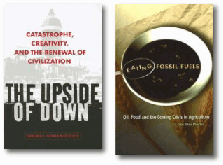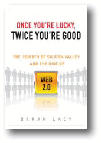
In his book: Reinventing collapse : the Soviet example and American prospects, Dmitry Orlov suggests that the planned economy of the USSR was in far better shape to endure its collapse than the market economy of the U.S. can be prepared for its own undoing. He makes a convincing argument so long as we think inside the box of existing economies. In brief, here is the argument he lays out:
- Lots of Soviet citizens live in public housing with "free rent". Only one third of US homes are owned outright. Two thirds of US "homeowners" can be evicted by defaulting on their mortgages. All can be evicted for failure to pay property taxes levied on their homes.
- Most food sold in Russian stores is the result of planned production by the government that does not account for making a profit or losing money. Most food sold in American stores is delivered by rival enterprises in a global capitalistic system that depends on profitability and private investment to stay in business.
- Most travel within urban centers in Russia relies on public transportation with government access to fuel supplies. Most travel in the US from the suburban sprawl to urban employment relies on private automobiles that become immobilized during gasoline shortages.
- Soviet students who want to continue their studies through college can do so for free or very little expense. American students go into massive debt to personally finance the cost of soaring tuition rates and exorbitant college expenses.
- Russians benefit from "free" public services for health care, social services, trash collection and prison operations. US citizens deal with an increasing number of privatized hospitals, social services, trash collection companies and prison operation enterprises -- that can all go out of business and suspend services.
- Soviet citizens get news and entertainment from state owned media outlets. Americans get their news and entertainment from advertising support media outlets that need audience share to attract revenue and robust economies for companies to afford to advertise.
- Russians have become accustomed to shortages of commodity goods which has taught them to stockpile essentials. US citizens rely on the stores, warehouses, trucking firms and suppliers to keep every shelf well stocked.
Extrapolating from Dmitry Orlov's argument, it's easy to imagine a nightmare scenario for the US. Evicted homeowners will be wandering suburban streets, sleeping in vacated homes, evading the over-taxed police and falling into substance abuse, suicide and crime. Cars will be abandoned wherever they ran out of gas. Trash will get piled high at the curb. Stores will have half empty shelves and shoppers will be unable to eat well or at all. Radio and TV will go off the air. Newspapers and magazines will suspend publications. Colleges will close their doors. Privatized governmental services, operating in the red, will release their patients, inmates and dependent clientele onto the public.
For this scenario to play out, several resources, safety nets and initiatives need to get counted out:
- The quantity and quality of innovations, creativity, user-generated content, and online collaborations in the past decade.
- The groundswell of initiatives, outreach and activism recently enjoyed to bring about Obama's election, Web 2.0 spaces and numerous crowdsourced resources
- The volume of digital communications between cellphones, PDA's and computers
- The potential nationalization of banks, broadband internet access, and privatized governmental services





